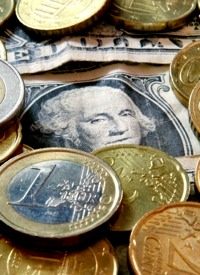
On November 30, the Fed announced in a press release that it was cutting the cost of temporary dollar liquidity swaps almost in half. The rate was slashed from about one percent to slightly over 0.5 percent, making it much cheaper for foreign central banks and the financial institutions they fund to borrow a practically unlimited supply of newly created U.S. dollars.
The news was met with outrage by Congressman Ron Paul, whose subcommittee deals with monetary policy and the central bank. Paul is once again calling for, among other measures, an audit of the Fed and the eventual restoration of honest money.
“The Fed’s latest actions in cooperating with foreign central banks to undertake liquidity swaps of dollars for foreign currencies is another reason why Congress needs enhanced power to oversee and audit the Fed,” said Rep. Ron Paul (R-Texas), the Chairman of the House Domestic Monetary Policy and Technology Subcommittee. “Under current law Congress cannot examine these types of agreements.”
President Obama promised this week that Americans were “ready to do our part” in dealing with the euro crisis. And so, according to Rep. Paul, the most recent bailout announced two days later shows the fallacy of arguments that auditing the Fed or its secret deals with foreign central banks would somehow harm the “independence” of monetary-policy bosses.
“Congress should not permit this type of open-ended commitment on the part of the Fed, a commitment which could easily run into the trillions of dollars,” Rep. Paul said in a statement. “These dollar swaps are purely inflationary and will harm American consumers as much as any form of quantitative easing.”
According to Paul, who predicted many of the economic problems plaguing the world today years before they became obvious, the Fed’s announcement illustrates how scared governments have become of the European financial crisis. But the new schemes will not solve the looming meltdown — they will simply delay the inevitable and make it worse.
“Central banks are grasping at straws, hoping that flooding the world with money created out of thin air will somehow resolve a crisis caused by uncontrolled government spending and irresponsible debt issuance,” the Texas Congressman said. “The Fed is behaving much as it did during the 2008 financial crisis, only this time instead of bailing out politically well-connected too-big-to-fail firms it is bailing out profligate government spending.”
The solution, Paul said, is simple: Restoring sound money. It would help prevent wild government spending, unsustainable debt, and widespread economic manipulation by central bankers — all key causes of the current crisis.
“Citizens the world over deserve better than this. They deserve sound money that cannot be manipulated and created out of thin air by central planners who promise printed prosperity,” explained Paul, a GOP presidential hopeful and long-time critic of the privately owned Federal Reserve System.
In fact, central banks and their power to create unlimited paper debt-money out of thin air are at the root of the problem. “Fiat money caused this European crisis and the financial crisis before it. More fiat money is not the cure,” Paul explained. “The global fiat currency system has proven itself a failure, we need real monetary reform. We need sound money.”
While Paul used to be an isolated voice criticizing the monetary system, more lawmakers have jumped on the bandwagon in recent years as the failure of central banking became increasingly obvious — and devastating. And the newest Fed bailout of European governments has other Congressmen up in arms, too.
“We should be under no illusion about today’s action by the Federal Reserve,” said Rep. Dan Burton (R-Ind.) in a statement. “The Federal Reserve’s decision to allow European banks to borrow American dollars cheaply, combined with the Administration’s action earlier in the week to double the United States financial contribution to the International Monetary fund is nothing more or less than a U.S. taxpayer bailout of Europe.”
Rep. Burton said that even though markets may have reacted positively to the newest bailout announcement, the long-term consequences will be devastating. “This boondoggle will only serve to further devalue our currency, increase inflation pressures, worsen our ability to rebound from the likely failure of the Euro, and make it that much harder to solve America’s own crushing financial problems,” he noted.
Like the American government, Burton said, European authorities do not have a revenue problem, they have a spending problem. And throwing American taxpayer money at the crisis will not solve the problem anymore than President Obama’s failed “stimulus” plan solved America’s woes, he concluded.
The coordinated central-bank easing policy, of course, will cause a depreciation in the value of all existing money. And it won’t even come close to solving the underlying problems, according to analysts.
The Fed insisted it was necessary to “ease strains in financial markets” and boost economic activity. Critics, however, are not buying it.
“That’s a bit like a bunch of doctors agreeing that the solution to the pain in a patient’s eye is to push the ice pick further into his eye,” noted Thomas Eddlem in a piece for The New American. “Yes, markets received a sense of security from the central banks’ action. But it is a false sense of security before the looming debt crisis breaks.”
The new coordinated central bank policy is not the first time Americans have been forced to bail out Europe in recent years. The Fed has been exposed secretly pumping trillions of dollars into European banks throughout the crisis.
And as the largest single contingent of contributors, U.S. taxpayers have long been partially financing all of the so-called “rescue” packages floated by the IMF. Lawmakers were furious back then, too.
“The bailout of Greece set a dangerous precedent of using American tax dollars for other European bailouts,” complained Rep. Mike Pence (R-Ind.) in a statement in May 2010. “Now Americans are waking up to the harsh reality that they may be on the hook to keep the Euro afloat as well.”
But the bailouts continue. In fact, on November 22, the IMF announced the creation of yet another obscure “credit facility” to pump American cash into bloated and insolvent European governments. And some financial insiders are even calling for the Fed to buy up bonds from the struggling regimes.
Euro Pacific Capital chief Peter Schiff, who has forecasted economic events of recent years with uncanny accuracy, said this week that the Fed would likely continue to debase the dollar for as long as possible. “This is not about economic growth, its about propping up insolvent financial institutions by creating inflation,” Schiff said, telling investors to stock up on precious metals now.
It remains unclear why key U.S. policy makers feel the need to try to save the failing European single currency and the continent’s bloated regimes by seizing wealth from already-struggling Americans. But according to experts, in addition to failing miserably while further damaging the U.S. economy, the scheme will continue to build pressure for real monetary reform around the world.
Photo: AP Images
Related articles:
Federal Reserve to Bail Out European Banks (Again!)
Fed Showered Money On Foreign Banks
Fed Audit: Trillions For Foreign Banks, Conflicts of Interest
Fed Manipulations in the Crosshairs
Fed, National Banks Decide on More Global Inflation
Another Secret Federal Reserve Bailout, $7.7 Trillion This Time



